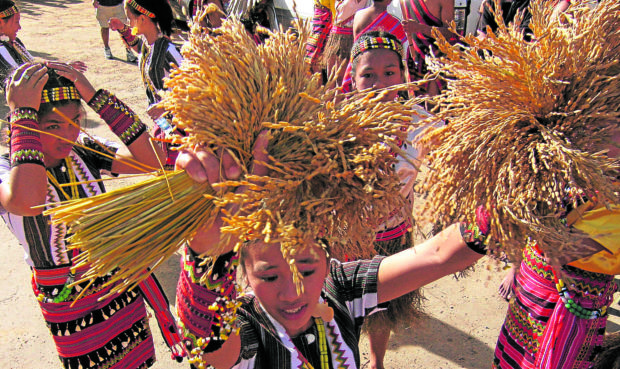
CULTURAL IMMERSION Children in indigenous peoples communities in the Cordillera region are encouraged by their elders to participate in cultural festivals so they can learn about the traditions and practices of their ancestors. —EV ESPIRITU
BAGUIO CITY—Teachers in the Cordillera have offered to produce instruction manuals and design classroom lessons about the “genuine Igorot way of life” to counter offensive portrayal of the region’s indigenous peoples in textbooks.
Estela Cariño, Cordillera director of the Department of Education (DepEd), on Monday said she informed Education Secretary Leonor Briones about her office’s plan to educate teachers in other provinces about ethnolingusitic groups in the region like the Ibaloy, Bontok, Tingguian, Ifugao and other Cordillera groups, collectively known as Igorot.
The proposal was made after images of activity sheets containing wrong and offensive information on Igorots were posted on social media.
An Igorot parent living in Bambang town, Nueza Vizcaya province, was enraged by the worksheets.
It contained phrases like, “Hindi ako makikipaglaro sa aking kaklase na Igorot dahil iba ang kanyang pananamit (I will not play with my Igorot classmate because of what he wears).”The parent posted the worksheets on social media on Jan. 29, which stirred online outrage and debates concerning discriminatory references about Igorots in textbooks that date back to 2000.
Awaiting assessment
One of the worksheets was written by a teacher in Sabtang, Batanes, Cariño informed the Baguio City council when it discussed the issue this week.It was among the materials stored at a DepEd online portal that were awaiting quality assessment when it was mistakenly accessed by a school in Nueva Vizcaya, she said.
Only 50 copies were distributed in Bambang Elementary School and were quickly replaced following the backlash, Cariño said.
These materials never reached other towns and provinces, she said.
“What? We are in the 21st century, and this still happens?” she quoted Briones as saying during their Feb. 5 management committee meeting.
During a subsequent discussion with DepEd officials, Cariño sought reforms on policies covering school literature.
“We cannot allow other people in the country to view indigenous Filipinos in the Cordillera as [people who are] lesser [in stature],” she said.
“I am an Igorota. What is wrong with my anyo (appearance)? What is wrong with my pananamit (garb),” Cariño recalled saying during another conversation with DepEd administrators.
Accurate materials
Cariño said the proposed manual would benefit educators like the Sabtang teacher, who may know little about the Cordillera.
The DepEd has no control over commercial textbooks unless these materials undergo its own screening and quality assessment process.
Publishers who distribute textbooks that insult indigenous peoples should be sanctioned, Cariño said.
Last week, Baguio’s city council passed a resolution urging the DepEd to finance research under its indigenous peoples education program to generate accurate materials for textbooks.
“The depiction of Igorots as backward and inferior keeps resurfacing despite safeguards in the 1987 Constitution which recognizes indigenous peoples rights, and other laws, so the problem has become institutional discrimination,” said Councilor Arthur Allad-iw, the resolution’s author.